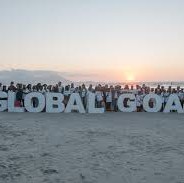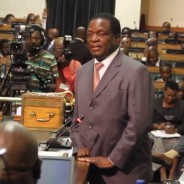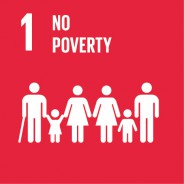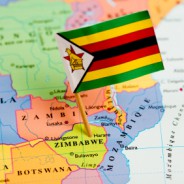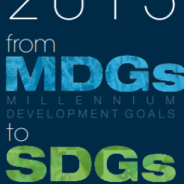How can we Deliver the SDGs?
 Five consideration’s for national evaluation agendas informed by the SDGs
Five consideration’s for national evaluation agendas informed by the SDGs
The following is taken from EVALSDGs‘ briefing paper, Five considerations for national evaluation agendas informed by the SDGs
Each country sets its own national agenda and strategy within the broad contours of the 2030 Agenda and its Sustainable Development Goals (SDGs), yet the Agenda gives little explicit guidance on how to do this. However, there is a perspective on development that offers direction. This perspective views development through a ‘complex systems’ lens. It is consistent with the 2030 Agenda because it considers development as a holistic, integrated, multifaceted and context-sensitive process that has diverse means and ends, and is intimately tied to sustainability. This briefing summarises five aspects of this perspective that emerged as important lessons for evaluation during the Millennium Development Goals era, and discusses their implications for national evaluation agendas that support countries’ achievement of the SDGs. It is the third in a collection of briefings discussing the role of evaluation in achieving the SDGs.
Policy pointers
National evaluation systems need to be grounded in a philosophy and practice of evaluation that is consistent with the Sustainable Development Goals’ interconnected nature.
Taking a ‘complex systems’ perspective on development is particularly useful for attending to this interrelated nature.
Lessons from the Millennium Development Goal era show that taking this perspective early on will enhance national evaluation systems as well as development results.
Five considerations can help resource-constrained countries to set national evaluation agendas and maximise the value of evaluation: thinking beyond single policies, programmes and projects; examining macro forces influencing success or failure; having a nuanced understanding of ‘success’; recognising the importance of culture; and adopting evaluative thinking and adaptive management.
Sustainable Development Goals
So … What are Sustainable Development Goals ??
Sustainable Development Goals are a set of 17 ambitious goals to improve livelihood , abbreviated as SDGs these are a universal set of goals, targets and indicators that UN member states will be expected to use to frame their agendas and political policies over the next 15 years. Hence the hash tag #agenda2030 .
Where did these goals come from ?
The Sustainable Development Goals, otherwise known as the Global Goals, build on the Millennium Development Goals(MDGs), eight anti-poverty targets that the world committed to achieving by 2015. The MDGs, adopted in 2000, aimed at an array of issues that included slashing poverty, hunger, disease, gender inequality, and access to water and sanitation. Enormous progress has been made on the MDGs, showing the value of a unifying agenda underpinned by goals and targets. Despite this success, the indignity of poverty has not been ended for all.
The new SDGs, and the broader sustainability agenda, go much further than the MDGs, addressing the root causes of poverty and the universal need for development that works for all people.
Why do we need another set of goals?
The eight MDGs – reduce poverty and hunger; achieve universal education; promote gender equality; reduce child and maternal deaths; combat HIV, malaria and other diseases; ensure environmental sustainability; develop global partnerships – failed to consider the root causes of poverty and overlooked gender inequality as well as the holistic nature of development. The goals made no mention of human rights and did not specifically address economic development. While the MDGs, in theory, applied to all countries, in reality they were considered targets for poor countries to achieve, with finance from wealthy states. Conversely, every country will be expected to work towards achieving the SDGs.
A list of the 17 goals –
1 Ending poverty in all its forms everywhere
2 Ending hunger, achieve food security and improved nutrition and promote sustainable agriculture
3 Ensuring healthy lives and promote well-being for all at all ages
4 Ensuring inclusive and equitable quality education and promote lifelong learning opportunities for all
5 Achieving gender equality and empowering all women and girls
6 Ensuring availability and sustainable management of water and sanitation for all
7 Ensuring access to affordable, reliable, sustainable and modern energy for all
8 Promoting sustained, inclusive and sustainable economic growth, full and productive employment and decent work for all
9 Building resilient infrastructure, promote inclusive and sustainable industrialization and foster innovation
10 Reducing inequality within and among countries
11Making cities and human settlements inclusive, safe, resilient and sustainable
12 Ensuring sustainable consumption and production patterns
13 Take urgent action to combat climate change and its impact
14 Conserving and sustainably use the oceans, seas and marine resources for sustainable development
15 Protecting, restore and promote sustainable use of terrestrial ecosystems, sustainably manage forests, combat desertification, and halt and reverse land degradation and halt biodiversity loss
16 Promote peaceful and inclusive societies for sustainable development, provide access to justice for all
and lastly
17 building effective, accountable and inclusive institutions at all levels and Strengthening the means of implementation and revitalize the global partnership for sustainable development .
But Zimbabwe has decided to prioritise 10 goals …
SDG 8 , 7 , 2 , 9 , 6 , 13 , 3 , 4 , 5 , and 17
Together we can
#myZimSDGs – Leaving no one behind
Parliamentary SDGs check
HON. KHUPE: Thank you very much Mr. Speaker Sir. My
question is directed to the Leader of the House, Hon. Vice President
Mnangagwa. In September 2015, world leaders gathered in New York
and they came up with sustainable development goals which are a
successor framework of the Millennium Development Goals. They
made a declaration that they were going to transform the world and they
also vowed that they were going to eliminate poverty by the year 2030.
As Zimbabwe, what is it that we are doing or have done to make sure
that there are monitoring and evaluation mechanisms to determine the
impact and sustainability of the sustainable development goals if indeed
we are to eliminate poverty by the year 2030.
THE VICE PRESIDENT AND MINISTER OF JUSTICE,
LEGAL AND PARLIAMENTARY AFFAIRS (HON.
MNANGAGWA): Thank you Mr. Speaker Sir, I also want to thank the
Hon. Member, the Vice President of MDC-T for the question. I want to
thank her for remembering what happened in 2015. I feel very elated
that she thinks that I should remember the decision which was taken at
that time. Mr. Speaker Sir, in terms of policy, I can assure the Hon.
Member and the House that everything is being done in the various subsectors
of the economy to improve the lives of our people. In particular,
coming to the situation of Zimbabwe, we believe that the primary
challenge we are facing in this country which I believe everybody who
is a citizen of this country would agree that we have a primary economy
which is on the bedrock of our agricultural sector.
Everything is being done by Government and the public sector to
support our agricultural sector so that we put behind the issue of
continuously importing food, whether there is good season in terms of
rain or there is drought. We have now put measures to make sure that
there is food sufficiency in the country. We wish to accomplish this
goal within the next four seasons. There are two seasons in a year, this
means in two years’ time, we shall have accomplished that area.
Then the other areas which are directed to dealing with the
question of alleviating or eradicating poverty among the people; we have
various sectors of the economy which deal with those issues. Obviously,
the economy is not performing well but everything is being done by
Government, private sector, public sector and parastatals to do our best
under these circumstances to make sure we improve the lives of our
people.
In the area of infrastructural development, I am sure colleagues are
fully aware about the projects that are underway which are unfolding in
the infrastructural development sector. We are also fully aware about
what is happening in the area of tourism. We have just completed the
runway at Victoria Falls which now is going to be able to take on board
bigger planes to land. As a matter of fact, China alone has something
like 250 million tourists per year which is expected to grow to 600
million by 2020. If we structure our tourism with countries of that
nature and various other countries worldwide, we believe that now with
the runway which we have completed, we should be able to improve our
tourism sector. As a matter of fact, the indication and projection of that
sector shows growth.
Mr. Speaker Sir, we also go into the areas of manufacturing and
ICT. We are attending to all these areas in order to improve the lives of
our people. More-so, we will continue to make sure that the areas of
health and education receive full attention and we hope to receive
cooperation from all citizens of this country.
I am aware that this subject is at the heart of the former Deputy
Prime Minister because when he was Deputy Prime Minister, she used
to champion this sector very ably and I still recognise that you have not
forgotten this thing which you were championing at that time. I thank you “
Ending poverty in all its forms everywhere
Eradicating poverty in all its forms remains one of the greatest challenges facing humanity. While the number of people living in extreme poverty has dropped by more than half – from 1.9 billion in 1990, to 836 million in 2015 – too many are still struggling for the most basic human needs.
Globally, more than 800 million people are still living on less than $1.25 a day; many lacking access to adequate food, clean drinking water and sanitation. Rapid economic growth in countries like China and India has lifted millions out of poverty, but progress has also been uneven. Women are disproportionately more likely to live in poverty than men due to unequal access to paid work, education and property.
Progress has also been limited in other regions, such as South Asia and sub-Saharan Africa, which account for 80 percent of the global total of those living in extreme poverty. This rate is expected to rise due to new threats brought on by climate change, conflict and food insecurity.
The Sustainable Development Goals (SDGs) are a bold commitment to finish what we started, and end poverty in all forms and dimensions by 2030. This involves targeting those living in vulnerable situations, increasing access to basic resources and services, and supporting communities affected by conflict and climate-related disasters.
Ending poverty is one of 17 Global Goals that make up the 2030 Agenda for Sustainable Development. An integrated approach is crucial for progress across the multiple goals
Zimbabwe’s priority 10 goals
In order of prioritisation
SDG Goal 8 – Promoting sustained, inclusive and sustainable economic growth, full and productive employment and decent work for all
SDG 7 – Ensuring access to affordable, reliable, sustainable and modern energy for all
SDG 2 – Ending hunger, achieve food security and improved nutrition and promote sustainable agriculture
SDG 9 – Building resilient infrastructure, promote inclusive and sustainable industrialization and foster innovation
SDG 6 – Ensuring availability and sustainable management of water and sanitation for all
SDG 13 – Take urgent action to combat climate change and its impact
SDG 17 – building effective, accountable and inclusive institutions at all levels and Strengthening the means of implementation and revitalize the global partnership for sustainable development
SDG 3 – Ensuring healthy lives and promote well-being for all at all ages
SDG 4 – Ensuring inclusive and equitable quality education and promote lifelong learning opportunities for all
SDG 5 – Achieving gender equality and empowering all women and girls
#myZimSDGs
SDGs: Unique lifetime opportunity to end poverty
Bishow Parajuli
THE world has reached a historic moment as world leaders adopted 17 Sustainable Development Goals (SDGs) in New York during the 70th United Nations General Assembly.
The SDGs constitute a vision to put people and our planet on a sustainable path by 2030. These goals will form the bedrock of a new development agenda designed to set the world on a course of action to end poverty, transform lives and protect the planet.
The SDGs spell out how we can work together to promote dignity, equality, justice, shared prosperity and well-being for all while at the same time protecting the environment. We are the first generation that can end poverty and the last one that can avoid the worst effects of climate change.
The Millennium Development Goals (MDGs), adopted 15 years ago whose lifecycle ends at the end of this year, show that millions of people’s lives have improved due to concerted efforts to achieve the MDG targets, on whose foundation the SDGs rest. Globally, the MDG targets have been met on extreme poverty, increased access to improved drinking water sources, improvement in the lives of slum dwellers, attainment of gender parity in primary school enrolment as well as halting and reversing the HIV epidemic.
In addition, the likelihood of a child dying before the tender age of five has been cut by nearly half. The maternal mortality ratio has also dropped by nearly half. More people are receiving anti-retroviral therapy for HIV-infection today than ever before. Upwards of six million deaths from malaria were averted due to substantial expansion of malaria interventions.
In general, enormous progress has been made under the MDGs, showing the value of a unifying agenda underpinned by goals and targets. Yet despite the progress, the indignity of hunger and poverty remains as reality for over 800 million people.
I have learned, from over 30 years of work in humanitarian and development spheres, as well as with the United Nations, that setting goals and targets work. Here in Zimbabwe, the MDGs were implemented during a difficult economic period. Despite the challenges the country faced, with Government leadership, support from the United Nations and development partners, it has made significant progress in some MDGs notably education, health and gender.
In the health sector, Zimbabwe has recorded progress in halting and reducing HIV prevalence, which fell from 29,6 percent in 1998 to 14 percent in 2014; increase in anti-retroviral therapy coverage for adults as well as increased coverage of prevention of mother-to-child transmission. This sterling progress on HIV and Aids, for example, was made possible due to government’s introduction of the Aids levy, and with the assistance of over US$1 billion provided by Global Fund through United Nations Development Programme (UNDP) and additional funding by other development partners such as the President’s Emergency Plan for AIDS Relief.
With government engagement and support from our specialised agencies such as World Health Organization, the United Nations Population Fund and the United Nations Children’s Fund (UNICEF) as well as with generous financial support from development partners, Zimbabwe has also reduced the maternal mortality ratio by more than half from 1069 deaths per 100 000 live births in 2002 to 526 deaths per 100 000 live births in 2014. Child immunisation also registered some progress. The country has also made progress in reducing under-five mortality rate from 120 deaths per 1000 live births in 2000 to 75 deaths in 2014.
In education, with government leadership and the introduction of a multi-year and multi-donor fund managed by UNICEF a 1:1 pupil to book ratio for core subjects in primary and secondary schools has been maintained while high universal literacy rate of 99 percent was achieved. Zimbabwe also attained gender equality in primary education and increased enrolment of girls in tertiary education.
On environmental sustainability, with support from the UNDP, the Food and Agriculture Organization, the World Food Programme and the United Nations Educational, Scientific and Cultural Organization in wetlands management, conservancies and the introduction of organic farming, the country has also done commendably well particularly in phasing out ozone-depleting substances. However, more needs to be done in addressing the effects of climate change.
Pope Francis in his recent report said: “I urgently appeal … for a new dialogue about how we are shaping the future of our planet. We need a conversation which includes everyone, since the environmental challenge we are undergoing, and its human roots, concern and affect us all.” Everyone has a role to play and we can add our voices to the ongoing global campaign called “Road to Paris” in support of a global deal on climate change which will take place later this year in Paris.
The above mentioned achievements exemplify how partnerships can be nurtured along agreed common development goals such as the MDGs. As Zimbabwe implemented the MDGs, development partners injected US$1 billion a year in Official Development Aid, of which US$400 million was channelled through the United Nations system to augment national resources.
Going forward, with the strong commitment of the government and support of the Unite Nations and development partners, Zimbabwe is well poised to implement the SDGs. In this regard, the country has had a series of consultations at both the national and local levels on adaptation and implementation of the SDGs.
Zimbabwe has recognised the need for strong institutions that foster peace, justice and inclusive societies to achieve the SDGs. The national constitution provides the establishment of key independent commissions which include national peace and reconciliation commission, through which the country continues to strengthen social cohesion and effective public service delivery.
The United Nations continues to be a strong partner in institutional capacity building as recently reiterated by the UNDP Administrator, Helen Clark, who said: “As custodians of the UN Resident Coordinator System, UNDP will leverage the full range of UN expertise to help countries identify what works, and to integrate Goal 16 [Peace, Justice and Strong Institutions] targets within their national plans, policies, and budgets.”
I believe that taking action to achieve the global goals and building greater shared prosperity is in everybody’s best interest and provides enormous investment opportunities that stand to benefit the people of Zimbabwe. Success will be driven by the Government and the people of Zimbabwe. In fulfilling our shared responsibility to implement the SDGs, I cannot over emphasise the need to maintain, if not increase, the provision of official development assistance to support developing countries such as Zimbabwe to complement their domestic resources.
The United Nations system in Zimbabwe remains a strong partner in supporting the country to end all forms of poverty and ensure no one is left behind. With the new, interconnected SDGs that apply to all, we can scale greater heights in our common quest and determination to chart a dignified future in and for Zimbabwe, and for all people in the rest of the world.
Bishow Parajuli is the United Nations resident coordinator and United Nations Development Programme resident representative in Zimbabwe.http://www.financialgazette.co.zw/sdgs-unique-lifetime-opportunity-to-end-poverty/

